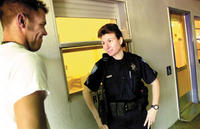
Daytime Curfews are still in the news and the talk doesn’t appear to be slowing. Interestingly, Eric Hogue, CA High School Conservative and I (Click Here) apparently find ourselves on the communist, big-brother government supporting end of this debate. (Does that make us liberal squishes? Ok, maybe Eric anyway! Just kidding!)
Anyway, I think that civil libertarians have some legitimate concerns about the implementation of daytime curfew ordinances. But many of their talking points just don’t hold up under direct scrutiny.
Take for example the following arguments given by The Home School Legal Defense Association.
1. Daytime curfews do not deter juvenile crime. Actually, the studies that have been done demonstrate an increase in youth arrests. A study done by the Center for Juvenile and Criminal Justice states:
Greater curfew enforcement was associated with significantly higher absolute rates of misdemeanor arrest for whites, Hispanics, Asians, and all youth in aggregate.
Please note that just because there is an increase in arrests that does not necessarily mean that there is an increase in crime. It could mean that law enforcement is doing a better job of catching youthful criminal offenders. Which in turn means that the increased emphasis on youth is working.
2. Daytime curfews allow searches without probable cause. This is a broad generalization of daytime curfews and does not speak to individual laws. And like any law, daytime curfews can be subject to abuse. But it is important to note that the same studies that say there is no proof that these laws work, state that there is also no statistical data supporting accusations that these laws have resulted in the widespread violation of civil liberties. As a matter of fact, little more that anecdotal data can be offered by curfew opponents.
3. Daytime curfews assume a person is guilty until proven innocent. Without speaking to every daytime curfew ordinance, I can say that the law offered up in Roseville does no such thing. Youth are offered the opportunity to provide proof to law enforcement that they are out of school legally. And if they fail to do so, they are given the opportunity to challenge the ticket in court. Isn’t this how we currently treat speeding tickets? Don’t these citations include a disclaimer stating that signing the document does not constitute an admission of guilt?
4. Daytime curfews punish all juveniles indiscriminately. First of all, since when did having a police ask you a question amount to punishment? The only students being punished are those who do not have a valid reason for not being in school. So how exactly is that being indiscriminant?
5. Daytime curfews preempt existing truancy laws. They do not preempt existing laws, they provide an enforcement mechanism. The problem with existing truancy laws is that they are long on rhetoric and short on action. Daytime curfews do little more that empower law enforcement to enforce these laws while in the daily performance of their law enforcement duties.
6. Daytime curfews are over broad & too vague. Another broad and vague generalization. I would encourage those interested in protecting civil liberties to spend time working with the authors of these ordinances to make sure they are more specific.
Additionally, much is left out of their arguments. For example:
1. We are talking about CHILDREN!!!!!!! There are reasons why we have special laws protecting minors; often times from themselves. I ask you to realize that just because you are the perfect parent and your little angel can do no wrong, does not mean that we should not have laws limiting the ability of non-emancipated minors to make grown up decisions. Otherwise we should rethink our position on issues like parental consent; the ability of a minor to consent to sex with adults; and age limits for drinking, smoking and access to adult material. Eric Hogue offers up some great arguments on this point.
2. School attendance figures are not addressed in available studies. They don’t address in these studies is the affect these laws have had in. I would be interested in knowing how this increased enforcement affected the average daily attendance in corresponding school districts.
3. This is not about new laws, but enforcement of existing truancy laws. In California, it is illegal for a minor, who has not graduated from high school or received their GED to not be in school. The problem is there are no enforcement measures or penalties offered in state law. The City of Roseville is simply offering and enforcement mechanism and penalties for offenders.
Even the Home School Legal Defense Association admits, “The solution to crime—juvenile and otherwise—is swift and severe penalties for breaking the law.” That is exactly what the Roseville ordinance does.
Having said all that, I am glad to see that the Roseville City Council has postponed their proposed curfew. I hope that groups like the Capitol Resource Institute (CRI) will work with them to produce a policy that addresses the truancy issue while making resident of Roseville feel that their civil liberties are in tact.
I would love to hear what you think. Please comment below.
Craig DeLuz
Visit The Home of Uncommon Sense...
www.craigdeluz.com
No comments:
Post a Comment